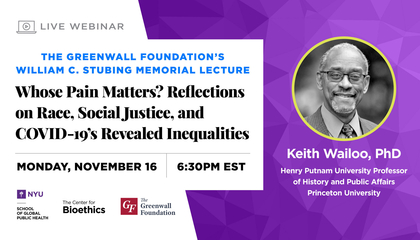The Greenwall Foundation, the NYU Center for Bioethics, and the NYU School of Global Public Health had the privilege of hosting the 2020 William C. Stubing Memorial Lecture entitled "Whose Pain Matters? Reflections on Race, Social Justice, and COVID-19’s Revealed Inequalities.”
With hundreds of attendees, the event featured Keith Wailoo, Ph.D., Henry Putnam University Professor of History and Public Affairs at Princeton University, and President of the American Association for the History of Medicine. He is an award-winning author on drugs and drug policy; race, science, and health; genetics and society; and the history of medicine, disease, health policy, and medical affairs.
Wailoo’s provocative and timely discussion comes as the United States battles the twin epidemics of COVID-19 and structural racism, both of which have revealed deeply embedded inequities in the fabric of the nation. His lecture offered reflections on pandemics and pain, the role of compassion in American culture, medicine and society, and “the place of intersubjective understanding” in everyday clinical encounters and public policy.
The discussion aimed to address three core questions:
- What has been revealed in this pandemic year, as in other past pandemic years?
- How do these revelations speak to the question of whose pain matters, as well as our social inequalities?
- What does this mean for ethics—particularly for the values of truth, our relations with one another, and the goal of building a society informed by foundational principles such as justice?
By using historical examples of past epidemics and pandemics to better understand the nature of inequalities on the basis of race, place, and socioeconomic status, Wailoo unearthed how certain types of pain belonging to certain groups of people often garner more attention than others. These disparities raise profound ethical questions of how to understand the pain of others and how to distribute resources equitably.
Wailoo also provided a nuanced discussion of interpersonal, relational ethics in the context of mask-wearing—or the lack thereof—and what it means for contemporary politics and the questions of whose pain matters, and whose breathing matters. This topic highlighted the racial irony of “white grievance” surrounding mask-wearing in contrast to Black Lives Matter protests in the wake of George Floyd’s tragic death. The fundamental grievances of Black Lives Matter protesters from an ethical standpoint are very different from white grievance; Black Lives Matter protesters' calls are rooted in an awareness of the gap in the values articulated by police departments across the nation to protect with courage and serve with compassion, whereas white grievance is rooted in misguided skepticism.
Reflecting on the contemporary political climate and COVID-19, Wailoo noted that the past four years have revealed “a great deal about ethics and the basics of civics”—do laws matter, do ethics matter, do lives matter? He also discussed how people who are fundamentally motivated by self-interest and selfishness can be mobilized by threats and by fears toward self-defense, leading to misguided, unethical action.
Wailoo’s presentation ended with reflections on how society can be rebuilt in order to ensure that fundamental principles of decency, justice, and equality are translated into lived realities for all.
In a follow-up Q&A session, questions included: how to begin to reconcile and heal the damaged relationships between racial and ethnic groups in the U.S.; how healthcare providers can take steps to improve social justice and pain management for racial and ethnic minorities; and the role of ethics in both everyday life and institutions.
